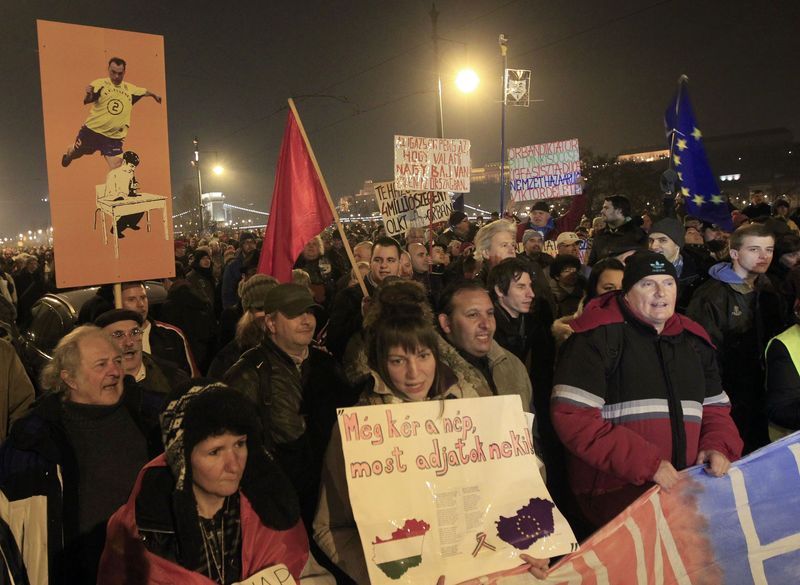By Krisztina Than
BUDAPEST (Reuters) - Thousands of Hungarians protested on Tuesday against tax hikes and perceptions of corruption, signalling rising discontent with Prime Minister Viktor Orban's government.
In the five years since he was elected prime minister, the charismatic Orban has courted controversy with Brussels, Washington and international financial institutions while managing to keep the majority of Hungarians on his side.
But in the past weeks, Orban has had to back down from a plan to tax Internet traffic that provoked huge protests, and has got into a war of words with Washington over allegations of corrupt Hungarian officials that has left some voters feeling he has gone too far.
Liberals have long disliked him, but in a new source of dissent, some of Orban's allies have begun voicing discontent with what they said was an unwanted display of wealth by some Fidesz ruling party politicians.
Orban has pledged zero tolerance to corruption, but for the first time since he rose to power, backing for Fidesz fell by more than 10 percentage points within a month.
A survey published last week by pollster Median put support for Fidesz at 26 percent, down from 38 percent in October, while Orban's personal support dropped to 32 percent from 48 percent.
Orban was re-elected in April after his government slashed energy bills for cash-stripped households and Fidesz remains the strongest political force.
But protesters in front of the Economy Ministry on Tuesday criticised a weakening of democracy, as well as reforms to education and policies that they said let down the poor.
With the Russian currency nosediving, Orban's gamble that close ties with the Kremlin could secure investment and trade could also backfire.
"I am here because I think the curbing of democratic rights of freedom hurts my human dignity," said Andrea Rauscher, a 58-year-old lawyer attending the protest that attracted a few thousand people.
Agnes Pozsa, 51, who has raised four children, said she was worried how she would get by after she retires, while her children had difficulty in securing their own futures.
Peter Kreko, director at think-tank Political Capital, said Fidesz was fighting on too many fronts.
"There is domestic pressure, the diplomatic pressure plus internal rifts within Fidesz, and the government is visibly not able to handle this pile of conflicts efficiently," he said.
Orban faces elections only in 2018 so the rallies pose no immediate threat, but if they became more institutionalised, they could become a risk, Kreko said.

The far-right Jobbik had 15 percent support, while the Socialists, struggling to recover from major election defeats, gained 4 points to 12 percent.
(Editing by Alison Williams)